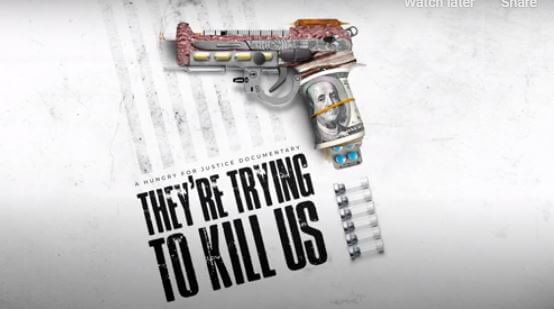 With hip-hop being one of the most influential music genres in the U.S., John Lewis (a.k.a. Badass Vegan) harnesses its power for the greater good in They’re Trying to Kill us, a new documentary about food injustice, race, Big Pharma and factory farming. In Factual America’s most recent podcast episode, which wraps up season one, John Lewis talks about the making of the film, becoming a vegan, but also how rap artists like Mya, Né-Yo, Mathematics, Professor Griff and Styles P got involved in promoting a healthy lifestyle.
With hip-hop being one of the most influential music genres in the U.S., John Lewis (a.k.a. Badass Vegan) harnesses its power for the greater good in They’re Trying to Kill us, a new documentary about food injustice, race, Big Pharma and factory farming. In Factual America’s most recent podcast episode, which wraps up season one, John Lewis talks about the making of the film, becoming a vegan, but also how rap artists like Mya, Né-Yo, Mathematics, Professor Griff and Styles P got involved in promoting a healthy lifestyle.
John Lewis, the co-director, protagonist and narrator of the food documentary is described by Factual America’s host, Matthew Sherwood, as the “cool poster child of veganism”. Growing up in one of the most violent cities in America, he found himself weighing 315 pounds at a very young age as a consequence of eating processed foods, so he starts his journey of becoming vegan and discovers his love of educating individuals on plant-based nutrition in the process.
The documentary currently in production, also co-directed by Keegan Kuhn from acclaimed documentaries like What the Health and Cowspiracy, seeks to empower people from underserved communities, so they can better understand the link between food choice, health, poverty and systemic racism, and ultimately contribute towards helping the environment and ending global hunger.
During the podcast, John talks about being in a state of emergency when it comes to our health, because if people have unequal access to food, they are still purchasing ingredients with no nutritional value, unaware of their consequences. It’s a lifestyle by design, not by choice, so he is an advocate for the importance of understanding what is going on, as consumers need to be empowered to make conscious decisions for themselves and not rely on the government for this.
He also dives into the social aspects of the conversation, where food inequality based on racial disparities are still present. Historically, African-American slaves would eat the waste and scraps that they could turn into delicacies; however, poverty nowadays has a similar effect on people’s access to food. “The system didn’t get dismantled, it just got a bit weaker”, John argues.
Badass Vegan also discloses how the idea of looking at this topic through the lens of hip-hop came about, and the benefits of introducing the concept of a healthy diet in the realm of urban culture with the help of hip-hop artists and popular athletes such as John Salley. To cover all perspectives, they also interviewed a variety of experts including doctors, politicians, lawyers and health practitioners too.
John is realistic and is not expecting the whole world to go vegan, but one of his solutions within reach for overturning the system is putting the right social pressure on each other and speaking up, “The only way that things are going to get better is for the silence to stop. (…) When you see something wrong, if you don’t say anything, you are part of the problem. At the end of the day, that will always be the truth (…) because you enabled that to keep going. So a lot of people always say that the racial divide is an imaginary divide, and that’s interesting because people are still dying because of this imaginary divide. They think that being silent or ignoring things will make them go away, but you need to take action and acknowledge the problem, so you don’t have to go back there again.” There are better solutions for helping people besides medication, and it starts with breaking unhealthy habits.
To find out more, listen to the full episode here: https://www.alamopictures.co.
Rishma
Latest posts by Rishma (see all)
- INTERVIEW | TRELL SAVONE: FROM BUNKIE TO THE WORLD WITH “SHINE” — June 30, 2025
- NEW MUSIC | MCSOLOMON AND DERAJAH ‘KINGSTON TO LONDON’ — June 30, 2025
- REDMAN RETURNS TO THE UK THIS SUMMER FOR HIS LONG AWAITED TOUR — June 26, 2025
